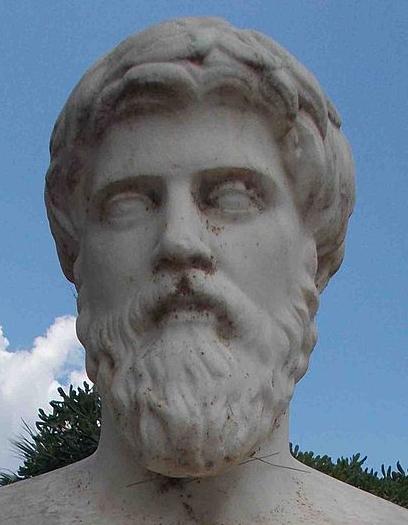Sin fuentes
Variante: No necesito amigos que cambien cuando yo cambio y asientan cuando yo asiento. Mi sombra lo hace mucho mejor.
Frases célebres de Plutarco
“El cerebro no es un vaso por llenar, sino una lámpara por encender.”
Sin fuentes
Variante: La mente no es un vaso para llenar, sino una lámpara para encender.
Frases de hombres de Plutarco
Frases de amistad de Plutarco
Plutarco Frases y Citas
“Quien tiene muchos vicios, tiene muchos amos.”
Fuente: Citado en Los Grandes Escritores: Vidas, obras y estilos de los más influyentes autores de la historia. Autor y editor Borja Loma Barrie, 2017.
Plutarco: Frases en inglés
63 Pelopidas
Apophthegms of Kings and Great Commanders
“King Agis said, "The Lacedæmonians are not wont to ask how many, but where the enemy are."”
58 Agis
Apophthegms of Kings and Great Commanders
“As it is in the proverb, played Cretan against Cretan.”
Life of Lysander
Bartlett's Familiar Quotations, 10th ed. (1919)
Consolation to Apollonius
“Be ruled by time, the wisest counsellor of all.”
Parallel Lives, Pericles
“He was a man, which, as Plato saith, is a very inconstant creature.”
On the Tranquillity of the Mind
Bartlett's Familiar Quotations, 10th ed. (1919)
How a Young Man ought to hear Poems, 4
Bartlett's Familiar Quotations, 10th ed. (1919)
“These Macedonians," said he, "are a rude and clownish people, that call a spade a spade.”
39 Philip
Apophthegms of Kings and Great Commanders
“When men are arrived at the goal, they should not turn back.”
Moralia, Of the Training of Children
Remarkable Speeches
Bartlett's Familiar Quotations, 10th ed. (1919)
“It is a difficult task, O citizens, to make speeches to the belly, which has no ears.”
Life of Marcus Cato
Bartlett's Familiar Quotations, 10th ed. (1919)
43 Alexander
Apophthegms of Kings and Great Commanders
48 Themistocles
Apophthegms of Kings and Great Commanders
Which are the most crafty, Water or Land Animals?, 7
Bartlett's Familiar Quotations, 10th ed. (1919)
“For to err in opinion, though it be not the part of wise men, is at least human.”
Against Colotes
Moralia, Others
οὐ γὰρ ὡς ἀγγεῖον ὁ νοῦς ἀποπληρώσεως ἀλλ' ὑπεκκαύματος μόνον ὥσπερ ὕλη δεῖται ὁρμὴν ἐμποιοῦντος εὑρετικὴν καὶ ὄρεξιν ἐπὶ τὴν ἀλήθειαν. ὥσπερ οὖν εἴ τις ἐκ γειτόνων πυρὸς δεόμενος, εἶτα πολὺ καὶ λαμπρὸν εὑρὼν αὐτοῦ καταμένοι διὰ τέλους θαλπόμενος, οὕτως εἴ τις ἥκων λόγου μεταλαβεῖν πρὸς ἄλλον οὐχ οἴεται δεῖν φῶς οἰκεῖον ἐξάπτειν καὶ νοῦν ἴδιον, ἀλλὰ χαίρων τῇ ἀκροάσει κάθηται θελγόμενος, οἷον ἔρευθος ἕλκει καὶ γάνωμα τὴν δόξαν ἀπὸ τῶν λόγων, τὸν δ᾽ ἐντὸς: εὐρῶτα τῆς ψυχῆς καὶ ζόφον οὐκ ἐκτεθέρμαγκεν οὐδ᾽ ἐξέωκε διὰ φιλοσοφίας.
On Listening to Lectures, Plutarch, Moralia 48C (variously called De auditione Philosophorum or De Auditu or De Recta Audiendi Ratione)
Moralia, Others
Of Bashfulness
Bartlett's Familiar Quotations, 10th ed. (1919)
42 Alexander
Apophthegms of Kings and Great Commanders
Life of Marcus Cato
Bartlett's Familiar Quotations, 10th ed. (1919)
“It is wise to be silent when occasion requires, and better than to speak, though never so well.”
Moralia, Of the Training of Children
“Fate, however, is to all appearance more unavoidable than unexpected.”
Parallel Lives, Caesar
